Orthodox
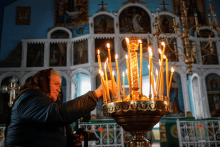
As a crowd gathered outside the white-brick Orthodox church in the village of Karyshkiv in western Ukraine, raised voices quickly turned to shouting. Soon old women were crying. The villagers were quarrelling over the affiliation of their parish church, which belonged to the Ukrainian Orthodox Church (UOC) that the government in Kyiv accuses of being under the influence of Moscow.
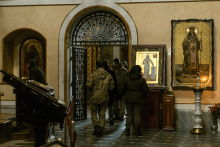
The Ukrainian government will draw up a law banning churches affiliated with Russia under moves described by President Volodymyr Zelenskiy as necessary to prevent Moscow being able to “weaken Ukraine from within.”
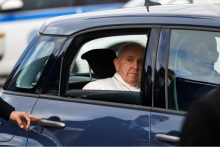
Pope Francis said on Monday he was willing to go to Moscow to meet Russian Orthodox Patriarch Kirill “brother to brother” in what would be the first trip by a pope to Russia.

What faces we see, either in person or in our hearts, carries a sacred and saving significance. Those of us with the luxury of being able to shelter in place because we have adequate space, who can maintain physical distance because there’s no need to be crowded, and who can wash our hands because we never have to think about soap and hot water, can exchange post-Easter greetings in safety, probably on Zoom. We treasure those bonds with one another in a socially isolated time.

APPROPRIATELY ENOUGH, The Saint of Lost Causes —the new Justin Townes Earle album—has an Orthodox icon of St. Jude on the cover. In Catholic lore, St. Jude is the patron saint of lost causes and desperate cases. But if a person can still turn to a saint for intercession, the cause isn’t entirely lost. The desperate act of prayer implies at least a sliver of hope for grace and mercy, and that’s mostly where the people in Earle’s new batch of songs are: down to their last desperate prayer but still hoping.
At the beginning of the album, in the title track, Earle lays it out, singing: “Now it’s a cruel world / But it ain’t hard to understand / You got your sheep, got your shepherds / Got your wolves amongst men.” Over the course of the next 11 songs, we see the world mostly from the point of view of the sheep. We hear from some fracked-out citizens in “Don’t Drink the Water” who are growing increasingly restless as some oil company hack keeps claiming that their poisoned land and water, and the occasional earthquake, are all an “act of God.” Later, in “Flint City Shake It,” a streetwise Michigander fills us in on how General Motors assassinated his still-resilient hometown. Then there’s the junkie desperado of “Appalachian Nightmare” who hopes God can forgive him at the moment of his death.
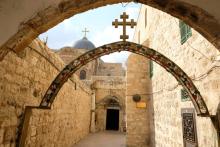
I constantly ask myself if I’m betraying my family by responding to the rituals and traditions they so earnestly sought to escape. But then I think about their conversion stories and how they made these decisions to become closer to Jesus.
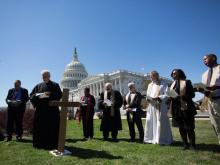
With ashes on their foreheads, sackcloth draped around their necks, and the U.S. Capitol as a backdrop, Christians leaders used the words “evil” and “immoral” to describe the federal budget cuts President Trump has proposed and many Republican lawmakers favor.
“It is a time for lamentation,” said the Rev. David Beckmann, explaining the symbols of grief the clergy brought to Capitol Hill on March 29.
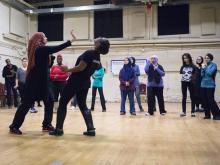
Melissa Grajek was subjected to all kinds of taunts for wearing the hijab, but an incident at San Marcos’ (Calif.) Discovery Lake sealed the deal.
Her 1-year-old son was playing with another boy when an irate father saw her and whisked his son away, telling Grajek: “I can’t wait until Trump is president, because he’ll send you back to where you came from.”
The man then scooped up a handful of wood chips and threw them at Grajek’s son.

In the summer of 430, the great Christian writer and bishop Augustine of Hippo lay dying as barbarians besieged his North African city – basically a mop-up operation in the slow-motion fall of the Roman Empire.
Today, in the fall of the year 2016, a lot of Christians can relate.

Some Protestant churches mark the day as Reformation Sunday, and celebrate it on the Sunday just before, or just after, Oct. 31. More often than not, the hymns sung in church that day include “A Mighty Fortress Is Our God,” with words and music composed by Luther himself. But most members of Lutheran churches — the direct descendants of Luther’s movement — wait until Oct. 31. And that, as we know, is also Halloween, and has led to some creative celebrations for kids.
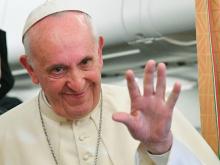
Pope Francis leaves on Monday, Oct. 31 for an overnight trip to Sweden, a historically Protestant country that today is one of the most secular in the world.
The visit is to mark the start of observances of next year’s 500th anniversary of the Reformation, which traditionally dates from Oct. 31, 1517, when Martin Luther nailed his 95 Theses to the door of a German cathedral.

In Jerusalem, Boehm said, there was a “very thin membrane” between the earthly and metaphysical.
That porousness is the origin of all the show’s marvelous art and of many of the city’s troubles, past and present. Almost lost on one wall of the show is a photograph of a glorious pulpit that stood in the Al-Aqsa Mosque from 1188 until 1969, when a delusional Australian torched it. He was trying to destroy the mosque so that the temple could be rebuilt to facilitate Jesus’ return.
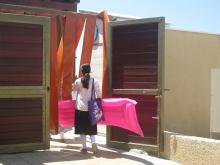
While some European beaches are banning women dressed in “burkinis” and other modest swimwear, and Americans are challenging women’s-only swimming hours at public pools, this Israeli beach has long been a haven for women whose strict religious beliefs, community norms or fears of sexual harassment, among other reasons, make swimming or sunbathing alongside men undesirable, even impossible.
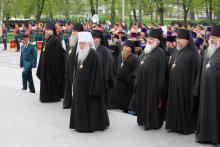
EASTERN ORTHODOX churches often pass beneath the media radar, despite their status as truly ancient. The attacks by ISIS on Orthodox communities in Syria, Iraq, and elsewhere have brought into focus dwindling populations of Christians in the Middle East. Russia’s invasion of Crimea and popular uprisings in Kiev raised the alarm on the tenuous position of Ukrainian Orthodox churches.
In February, headlines were made again when Pope Francis and Patriarch Kirill met in Cuba, the first-ever meeting of a pope and a Moscow patriarch. Additionally, a historic meeting will be held in June on the Greek island of Crete, bringing together leaders of all 14 loosely linked Orthodox churches for the first time in 12 centuries.
Both the pope-patriarch encounter and the troubled preparations for the convening of the pan-Orthodox leaders are extremely complex; one might call them Byzantine.
The meeting between the pope and the patriarch of the Russian Orthodox Church was years—and several papacies—in the making. There were always obstacles, not the least of which was the Soviet system and bitter internecine church wars in Ukraine that pitted the Roman Catholic-affiliated Ukrainian Greek Catholic Church against the Russian Orthodox Church. After the end of the Soviet regime, the UGCC entered a renaissance and the Orthodox churches in Ukraine splintered, which Moscow has cited as a reason for refusing any meeting between the Russian Orthodox and Roman Catholic Church.
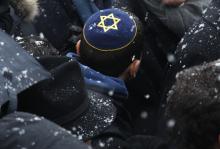
Claude Chiche doesn’t wear a skullcap, but he has strong opinions about them. “There are some here want to take off their kippah because they’re afraid,” said Tunisian-born Chiche, referring to the Hebrew word for yarmulke or skullcap. “But they shouldn’t accept this; they shouldn’t give in to fear.”
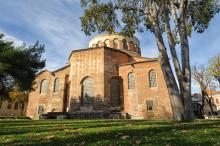
A religious summit last held more than 1,200 years ago suddenly risks being downgraded or postponed because of Syria’s four-year civil war. This unexpected twist has come as the world’s Orthodox churches, the second-largest ecclesial family in Christianity, were supposed to be only months away from their first major council since 787.
Now it is no longer clear when or where the Holy and Great Council of the Orthodox Church, a summit first proposed at least as far back as 1961 and provisionally scheduled for May in Istanbul, will be held.
With its traditional icons and complex liturgies, Orthodox Christianity can seem like an unchanging remnant of a long-lost era. But it lives very much in today’s world and its 14 autocephalous (independent) member churches can be wrapped up in its politics and subject to its pressures.
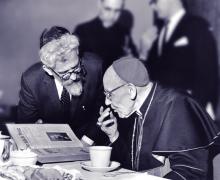
A statement by a group of Orthodox rabbis calls Christianity part of a divine plan in which God would have Jews and Christians work together to redeem the world.
Although signed so far by 28 rabbis mostly from the more liberal wing of the most traditional branch of Judaism, the statement marks a turning point for Orthodox Jews, who until now have limited interfaith cooperation to working on social, economic and political causes. But this statement puts Christianity in a distinct Jewish theological perspective — and an extremely positive one.
“(W)e acknowledge that Christianity is neither an accident nor an error, but the willed divine outcome and gift to the nations,” the seven-paragraph statement, issued on Dec. 3, asserts.
Nadia Bolz-Weber's church, House for All Sinners and Saints, is not your typical Lutheran church.
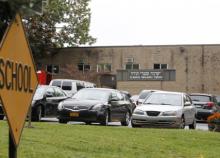
In a bizarre case involving threats of kidnapping, beatings, and physical torture — including the use of an electric cattle prod — two rabbis were charged in New Jersey in a scheme to force men to grant their wives religious divorces.
Two others were also charged in the case, which grew out of an undercover sting operation involving a female FBI agent who posed as a member of the Orthodox community seeking a divorce.
As many as six others may also be charged, officials said.
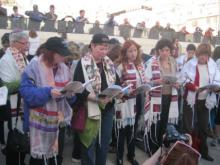
JERUSALEM — In a stunning reversal, a feminist Jewish prayer group said it will consider a government proposal to allow a mixed-gender prayer space at the Western Wall — but only after the government agrees to their conditions.
For 25 years, Women of the Wall has demanded access to pray at the sacred site that is home to the remnants of the Jewish Temple and is overseen by the Orthodox religious establishment. The group objects to the restrictions placed on them when they pray in the women’s section. They want to continue to pray in that section but will consider a compromise.
After a “comprehensive and emotionally trying decision-making process,” the group’s executive board on Monday overwhelmingly decided “to create a future in which, under the right conditions,” its members will pray “in an equal and fully integrated third section of the Kotel,” the Hebrew word for the Western Wall.
Women of the Wall has demanded the right to pray directly from a Torah scroll, wearing prayer shawls and phylacteries — practices and rituals that strict Orthodox Judaism reserves for men.